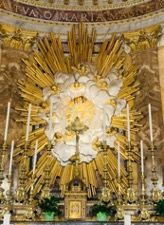Music Notes from Denise, May 18, 2024
- May 18, 2024
- 3 min read

This Sunday we will celebrate the Day of Pentecost with a focus on the Holy Spirit. Our processional will be illuminated by waving silk streamers from the choir and children to simulate the breath of the Holy Spirit descending upon God’s people. Our Processional hymn will be a fairly new one, Gracious Spirit, give your servants, written by Carl P. Daw, Jr. This beautiful hymn to the Holy Trinity was written for the Consecration of the Rt. Rev. Andrew D. Smith, Bishop Suffragan of the Diocese of Connecticut, on May 4, 1996. Because the chief act of Ordination and Consecration is the invocation of the Spirit at the laying-on of hands, this hymn reverses the normal order of Trinitarian praise, beginning with the Holy Spirit and ending with God the Father. Another feature worthy of note is that this Consecration hymn prays for the Church, the whole Body of Christ, rather than for the bishop-elect. Finally, it is worth noting that Dr. Daw’s care in using inclusive language for the fourth stanza has resulted in a doxology which truly expands our praise of God (neverending, unbegun) while uniting Incarnation to mission (through us may the world behold you, find your love, your truth, your light). (John L. Hooker in Leaders’s Guide to Wonder, Love, and Praise hymnal supplement, 1997 by The Church Pension Fund) We will use this fourth stanza as our Glory to God doxology each Sunday during the summer. The tune is Hyfrydol, the same one that we sung last Sunday for the hymn Alleluia! Sing to Jesus. As you recall, the Welsh tune means “tuneful” or “pleasant” and was composed by Rowland Hugh Prichard in 1830 when he was only 19. The text praises God and the Holy Trinity and describes how it strengthens us and helps us to carry out God’s mission for the church.
Our Sequence hymn will be Come down, O Love divine, written by Bianco da Siena who was an Italian monk who wrote poems called laudi spirituali in the fourteenth century. This hymn is addressed to the Holy Spirit. Though the third Person of the Trinity is not specifically named until the very last line of the hymn, it is clear through the terms “O Love divine” and “O Comforter” that the Holy Spirit is the one to whom this prayer is addressed. Ralph Vaughan Williams wrote the tune Down Ampney for this text in the English Hymnal in 1906. It was named after his birthplace, and has been praised as one of the most beautiful hymn tunes ever written. (hymnary.org)
St. Martin’s Choir will sing You sent your Holy Spirit by Mary Rose Jenson. Jensen began writing songs for the children’s choir she directed at church when her own two daughters were toddlers. In 1991 she and her husband, Mark Jensen, established Garden Rose Music to publish Songs of Joy, a print and recorded music project designed to teach children the basics of the Christian faith. You sent Your Holy Spirit on the day of Pentecost, With tongues of fire and tongues that told the Gospel to the lost. You strengthened Your disciples through the mighty wind that blew. O God, we ask that You would give the power that they knew. You sent Your Holy Spirit to equip Your church to tell The news that Jesus rose again, defeating death and hell. You scattered your believers to all corners of the earth. O God, we ask that You would give us ways to teach your worth. (2014 St. James Music Press)
Our final hymn uses the Land of Rest tune that we also are singing for our summer Sanctus. The text for The Spirit Sends Us Forth to Serve, was written by Sr. Delores Dufner, a member of St. Benedict’s Monastery in St. Joseph, MN. She has been named one of the premier female Roman Catholic hymn writers in the U.S. and her writing comes from her extensive involvement in liturgy and music in the Catholic Church. “This hymn flourishes with action verbs: bring, comfort, help, serve. Sr. Dufner cleverly reiterates the first stanza through the last stanza, as she sends the congregation forth in Jesus’ name through the working of the Holy Spirit.” (umcdiscipleship.org/1993 OCP Publications)